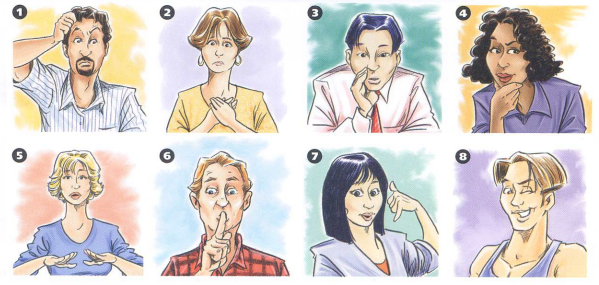
- •Раздел 1. В Офисе At the office
- •Тема 1.1 Знакомство Acquaintance
- •3.Выполнить упражнения № 9,10.
- •Дидактический материал к занятиям 1.1.1, 1.1.2., 1.1.3
- •In the Office
- •Eye contact
- •Read my Lips
- •Тема 1.2 Условия для трудовой деятельности Conditions for labor activity
- •4. Выполнить упражнения № 4-7
- •5. Прослушать текст и выполнить задания (упр. 2-3, 9)
- •4. Выполнить упражнения №1,2,5,9.
- •4. Выполнить упражнения № 1, 2, 5, 6, 7
- •Дидактические материалы к занятиям 1.2.1, 1.2.2.,1.2.3
- •T he active workplace
- •What to wear to get that job?
- •Office fire safety tips
- •If you are unable to evacuate
- •Тема 1.3. Должности и взаимоотношения; корпоративная культура Posts and interrelations; corporate culture
- •4. Выполнить упражнения №1-4
- •5. Прослушать текст и выполнить задания (упр. №2)
- •4. Выполнить упражнения №21-22
- •3. Выполнить упражнения №33-35
- •Дидактический материал к занятиям 1.3.1.,1.3.2.,1.3.3.
- •Ford of britain
- •Bic’s success in a throwaway world Bic is a household name, synonymous with a disposable age.
- •Company history
- •Office workers “admit being rude”
- •Admit avoid ignore introduce invest improve respond
- •Раздел 2. Планирование рабочего и свободного времени Planning of working time and free time
- •Тема 2.1. Рабочий день Working day
- •Выполнить упражнения №1-3
- •Выполнить упражнения №1-3
- •Дидактический материал к занятиям 2.1.1, 2.1.2, 2.1.3
- •Part-time Job, full-time benefit
- •World of work. Do we live to work or work to live
- •Тема 2.2. Развлечения Entertainment
- •4.Выполнить упражнения №1-3, 6, 9, 10
- •4. Выполнить упражнения №1-6, 11
- •5. Прослушать текст и выполнить задания (упр. № 12)
- •4.Выполнить упражнения № 7,14-20
- •5.Прослушать текст и выполнить задания (упр. № 8)
- •Дидактический материал к занятиям 2.2.1, 2.2.2, 2.2.3
- •Vocabulary practice
- •Vocabulary practice
- •Vocabulary practice
- •Тема 2.3. Отпуск Holiday
- •4. Выполнить упражнения №4-11
- •The weather
- •Vocabulary Commentary
- •Your checklist for travelling abroad
- •Раздел 3. Особенности питания в России и за рубежом Nutrition peculiarities in Russia and abroad
- •Тема 3.1. Магазины и покупка продуктов Shops and buying products
- •Дидактический материал к занятиям 3.1.1, 3.1.2, 3.1.3
- •Step 2. Summarise the results (%) Step 3. Display them for the whole class.
- •Britain’s Young Consumers
- •Ex 7. Listen to the conversation between two friends and mark the statements as true (t) or false (f).
- •Your problems... Solved!
- •Coca-Cola and its advertising
- •Тема 3.2. Деловой ужин Business Dinner
- •Дидактический материал к занятиям 3.2.1, 3.2.2, 3.2.3
- •British Cuisine
- •A brief history
- •The Great British Breakfast!
- •Independent work
- •Ex 7. Fill in the gaps with much or many.
- •Ex 8. Fill in the gaps with little or few.
- •Ex 9. Fill in the gaps with little, a little, few or a few.
- •Ex 3. In pairs, act out similar dialogues on the topic “How To Choose a Restaurant” Use phrases from the list below. How To Choose a Restaurant
- •Independent work
- •10 Tips for showing good manners over lunch or dinner
- •Тема 3.3.Традиции русской и других национальных кухонь Traditions of Russian and other national cuisines учебно-методическая карта занятия № 3.3.1
- •Учебно-методическая карта занятия № 3.3.2
- •Учебно-методическая карта занятия № 3.3.3
- •Дидактический материал к занятиям 3.3.1, 3.3.2, 3.3.3
- •Vocabulary Practice
- •Peculiarities of national british cuisine
- •Vocabulary Practice
- •Tastes are different
- •American food and their manner of eating
- •Vocabulary practice
- •Russian Cuisine Recipes
- •Vegetable Okroshka recipe
- •British Cuisine Recipes
- •Раздел 4. Составляющие имиджа специалиста Components of a specialist’s image
- •Тема 4.1. Стили одежды Wearing styles
- •4. Выполнить упражнения №3-5
- •5. Прослушать текст и выполнить задания (упр. №18)
- •4. Выполнить упражнения №12-14
- •4. Выполнить упражнения №15-17
- •5. Прослушать текст и выполнить задания (упр. №11)
- •Научиться переводить на родной язык письменные и устные неофициальные и официальные приветствия друзей, коллег, работающих в различных учреждениях за рубежом
- •Дидактический материал к занятиям 4.1.1, 4.1.2, 4.1.3
- •What Is the Business Professional Dress Code?
- •Vocabulary practice
- •A Short History of Youth Street Fashion
- •Trendy occupations: What are the really fashionable doing to earn their living
- •What clothes do people wear in Britain?
- •Тема 4.2. Покупка одежды Buying clothes
- •Дидактический материал к занятиям 4.2.1, 4.2.2, 4.2.3
- •Seasonal clothes for women
- •Vocabulary booster
- •Shop till you drop
- •At the clothes shop
- •Тема 4.3. Создание имиджа Image creating
- •Дидактический материал к занятиям 4.3.1, 4.3.2, 4.3.3
- •Image Making
- •Vocabulary practice
- •Clothes count for first impressions only
- •Body Language
- •Types of nonverbal communication and body language
- •Worries about Physical Appearance
- •Define your style
- •Раздел 5. Молодежь в России и за рубежом Young people in Russia and abroad
- •Тема 5.1. Система образования в России, Англии и сша. Educational system in Russia, England and the usa
- •Дидактические материалы к занятиям 5.1.1, 5.1.2, 5.1.3
- •My School Day
- •The british educational system
- •Our University (a Letter)
- •Тема 5.2. Социальные проблемы молодежи Social problems of young people
- •3. Выполнить упражнения № 6-8
- •2. Выполнить упражнения № 1-3
- •Дидактические материалы к занятиям 5.2.1, 5.2.2, 5.2.3
- •Vocabulary
- •Natasha’s story
- •Ecstasy, Euphoria… and Death
- •Тема 5.3. Увлечения молодёжи Passions of young people
- •4. Выполнить упражнения № 4-6.
- •3. Выполнить упражнения № 4-6.
- •3. Выполнить упражнения № 3, 4.
- •Дидактический материал к занятиям 5.3.1,5.3.2,5.3.3
- •Extreme sports
- •Music in our life
- •Enrico Caruso
- •Раздел 6.Здоровьесберегающие технологии. Health keeping technologies
- •Тема 6.1. Вредные привычки. Harmful habits
- •If you had a big problem like Victoria, who would you ask for help?
- •Are you hooked?
- •Тема 6.2. Охрана окружающей среды Environmental protection
- •Дидактический материал к занятиям 6.2.1, 6.2.2, 6.2.3
- •Enviro-Myths You Can Stop Believing
- •Why We're Destroying the Earth
- •Тема 6.3. Безопасность на производстве Safety at the factory
- •4. Выполнить упражнения № 1 - 4
- •Выполнить упражнения №4 - 7
- •Дидактические материалы к занятиям 6.3.1,6.3.2, 6.3.3
- •Stress at Work
- •Vocabulary
- •Stressed
- •Ex 21. Read the article about office accidents and write a report about their reasons and ways to avoid them. Lesson 6.3.2. Office Accidents
- •Preventing office injuries
- •Causes of office accidents
- •Ex 4. Give some advises to your friend how to Preventing office injuries.
- •Health and Safety
- •Health and Safety at Work
- •Health and Safety Claims and Industrial jobs
- •Health and safety in public places
- •Раздел 7. Современные технологии Modern technologies
- •Тема 7.1. Технические инновации в повседневной жизни Technical innovations in everyday life
- •Дидактические материалы к занятиям 7.1.1,7.1.2, 7.1.3
- •The digital age
- •Wahing machine instruction
- •Тема 7.2. Современные средства коммуникации: электронная почта, мобильный телефон, компьютер. Modern means of communication: e-mail, mobile phone, computer.
- •Дидактические материалы к занятиям 7.2.1,7.2.2, 7.2.3 Modern means of communication: email, mobile phone, computer.
- •Computers Make the World Smaller and Smarter
- •No mobile phones at school
- •Тема 7.3. Современные средства коммуникации: электронная почта, мобильный телефон, компьютер. Modern means of communication:email, mobile phone, computer.
- •Дидактические материалы к занятиям 7.3.1,7.3.2, 7.3.3
- •Dawn of the Cyberbabes.
- •What is Biotechnology?
- •Cloning of a Ewe ( The Roslin Method)
- •8.Clusters of embryonic cells
- •9.A surrogate mother
- •Раздел 8. Профессии и карьера Profession and career
- •Тема 8.1. Техническое и гуманитарное образование в России и за рубежом Technical and humanitarian education in Russia and abroad
- •Дидактические материалы к занятиям 8.1.1,8.1.2, 8.1.3
- •Mine surveying
- •Chemical technology for natural fuels and carbon materials
- •Power stations
- •Insulation, cable and capacitor engineering
- •Cooperative Kids
- •Vocabulary Practice
- •Cambridge University
- •Higher education
- •Тема 8.2. Специфика профессии.
- •Дидактические материалы к занятиям 8.2.1,8.2.2, 8.2.3
- •Living by the Sword
- •Vocabulary practice
- •What is a manager?
- •Management qualities
- •Income: Wage vs Salary
- •Тема 8.3. Поиск работы и продвижение по службе.
- •Дидактические материалы к занятиям 8.3.1,8.3.2, 8.3.3
- •On the job market
- •Resume as it is
- •Job interview
- •Раздел 9. Международное сотрудничество International collaboration
- •Тема 9.1. Деловая поездка за рубеж Business trip abroad
- •Дидактический материал для занятий 9.1.1, 9.1.2, 9.1.3.
- •British Visas (Part 1)
- •Vocabulary practice
- •British Visas (Part 2).
- •Coverage for Hospital Treatment
- •Arriving in the uk (Passport Control and Customs)
- •Vocabulary practice
- •Hubs and spokes
- •Vocabulary practice
- •Тема 9.2. Деловые контакты с зарубежными партнерами. Business contacts with foreign partners
- •Дидактические материалы к занятиям 9.2.1,9.2.2, 9.2.3
- •Vocabulary
- •Check-in at a Hotel
- •Hotel Information
- •Hotel Lobby
- •Hotel Problems
- •Complaints
- •Room service
- •Check-Out
- •Presentations
- •U.S. Plans Fellowships for Graduate Students
- •Vocabulary
- •When egOs* collide: In the acquisitions jungle, alpha* males are deal-breakers
- •Vocabulary
- •Тема 9.3. Прием зарубежных партнеров в России
- •Дидактические материалы к занятиям 9.3.1,9.3.2, 9.3.3
- •How to Plan a Business Tour
- •Meeting at the airport
- •Sun tours: Short breaks in New York
Clothes count for first impressions only
The Russian proverb says “Clothes count for first impressions only”. Nevertheless, it is quite important nowadays how you look. You are what you wear. Your clothes make a great impression on people. Everybody knows that we wear clothes for safety, comfort and to reflect religious, cultural and social meaning.
Surveys say that it is natural to see students or teenagers wearing jeans, T-shirts etc. But if you work in a company you should follow the dress code: to wear suits, jackets and so on. The dress code has social significance. All societies, groups have their own dress codes, most of which are unwritten but understood and accepted by most members. Various traditions suggest that certain items of clothing intrinsically suit different gender roles. In particular, the wearing of skirts and trousers has given rise to common phrases expressing implied restrictions in use and disapproval of offending behavior. So, one should be very attentive and neat in his/her dress.
Nowadays, makeup and perfume play a great role. Gaudy and flashy makeup or pungent and strong smell of your perfume have no good effect on how people treat you.
Lesson 4.3.2. Facial expression and gestures
Ex 1. Look at the pictures. Then discuss the questions below.



What do the people’s expressions and gestures tell you about their feelings?
Can any expressions or gestures have different meanings?
Do you ever use these gestures? When?
Do you usually show or hide your feelings? Why?
Ex 2. Read the title of the text. What do you think the information is about?
Body Language
Dr Kevin Lacely is a psychologist who specializes in body language – that is, the way people unconsciously reveal their thoughts and feelings simply by the way they sit, stand or move their arms. “Nowadays,” Dr Lacely says, “more and more people recognize that, in order to make a good impression, saying the right thing isn’t enough. How we say it, and the body language we use, can be just as important”. So what does he suggest we do to improve the sort of message our body language is sending? “Firstly, don’t cross your arms or legs,” he advises, “and if you are wearing a jacket, open it. And open posture makes people think that you are being honest and having nothing to hide. If you want to show that you are interested in what someone is saying, you shouldn’t lean forward and tilt your head slightly to one side. Making direct eye contact is usually a good idea, too – although in some cultures it can be a sign of disrespect.” It can also be very useful to be able to understand someone else’s body language. If, for example, you want to know whether someone is telling the truth or not, there are a number of signs to look out for. “If someone’s eyes dart around the room and they repeatedly touch their face,” Dr Lacey explains, “especially by covering their mouth with their hand, there is a good chance that the person is not being completely honest”. Remembering these simple points, he insists, can prove to be very useful in all sorts of situations.
Ex 3. Read the text again and say if these statements are True or False? Explain your answers.
1.Body language is connected with conscious display of a person’s thoughts and feelings.2.To say right words is enough to make a good impression. 3. To show the interest in somebody’s information you should lean forward. 4. Making eye contact is a sign of respect in any culture. 5. To show that you are absolutely honest you should cover your mouth with the hands. 6. It is necessary to know the language of the body to feel well in any situation.
Ex 4. Look through the text and try to explain the words in bold.
Ex 5. Look at these common gestures people use in the United States. Match the pictures with their meaning below.

____ I’m thinking ____ I’m sorry ___ It’s a secret ____ Calm down
____ Phone for you ____I’m puzzled ___ Just kidding ____ Be quiet
Ex 6 . Discuss these questions with your partner.
Which gestures have the same meaning in your culture?
Which gestures have a different meaning?
What gestures do you use to communicate these ideas?
Are there any gestures you especially like? Dislike? Why?
Ex 7. Translate from English into Russian.
